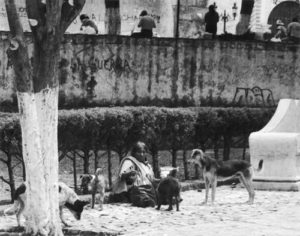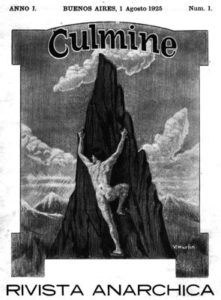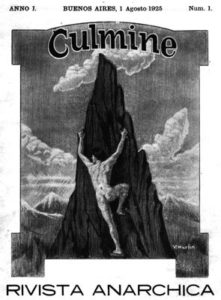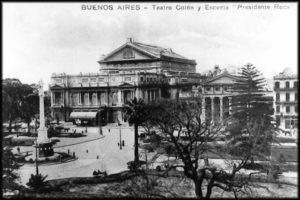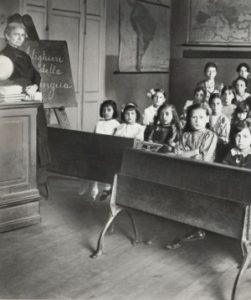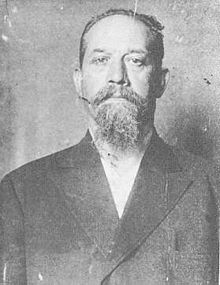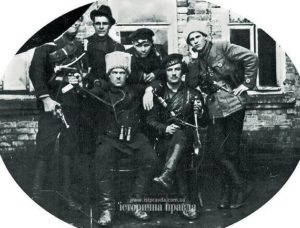We do not know the precise year of Passos’s birth (it was probably towards the end of the 19th century), but, from the books of Edgar Rodrigues, we know that he was born in Rio de Janeiro state. We find his first appearance in social struggles of the time as a UOCC delegate at the 3rd Brazilian Workers’ Congress (1920) at which he was elected as travel secretary for the Brazilian Workers’ Confederation (COB). Passos had been selected for that post because he stood out in the ranks of the organised proletariat on account of his intellect and oratorical gifts which he had honed in the day to day struggles of his trade.
Tag Archives: 1925
Stille e stili…
Severino Di Giovanni – Stille e stili …Urlìo notturno
Stille e stili…
Urlìo notturno
Finita la festa di luce, quel crepuscolo ebbro di rosso se ne andava lontano nelle profonde voragini del suo impero.
Continue reading Stille e stili…
PER L’ERTA SALITA….
Con le forze dei muscoli e gli sprazzi del pensiero, uniti con tutti quelli che possiedono una mente fertile, sana, aperta ed un cuore palpitante ad ogni atto buono e leale.
Consci dell’enorme difficoltà a cui andiamo incontro, pur nondimeno ci spinge una forza arcana che unita a molte speranze, si alimenta in quella fede grandissima che e’ l’Anarchia.
E per la realizzazione di questa nostra aspirazione, confidiamo ancor più, nelle forze e nell’entusiasmo dei compagni di buona volontà.
Il Gruppo Editoriale
Culmine n. 1 agosto 1925
PER L’ERTA SALITA….
Con le forze dei muscoli e gli sprazzi del pensiero, uniti con tutti quelli che possiedono una mente fertile, sana, aperta ed un cuore palpitante ad ogni atto buono e leale.
Consci dell’enorme difficoltà a cui andiamo incontro, pur nondimeno ci spinge una forza arcana che unita a molte speranze, si alimenta in quella fede grandissima che e’ l’Anarchia.
E per la realizzazione di questa nostra aspirazione, confidiamo ancor più, nelle forze e nell’entusiasmo dei compagni di buona volontà.
Il Gruppo Editoriale
Culmine n. 1 agosto 1925
Severino Di Giovanni – Volantino lanciato nel teatro Colón (Buenos Aires, 1925)
Buenos Aires, 6 giugno 1925 – Volantino lanciato dagli anarchici dal loggione del teatro Colón
… Santificatori della monarchia Sabauda avete dimenticato che proprio sotto il regno di Vittorio Emanuele III, per grazia di Dio e volontà… di pochi Re d’Italia; sorse, si alimentò nel sangue, quell’accozzaglia di briganti che si chiamano i FASCISTI… con tutti i suoi Dumini, i Filippelli, i Rossi, i De Vecchi, i Regazzi, i Farinacci… e che trova in Benito Mussolini la più precisa e perfetta raffigurazione di tutte le infamie…
Glorificatori della Monarchia appuntellata dal pugnale dei Dumini scrivete nella storia della Casa Savoia questo nome glorioso:
Matteotti!
Ricordate i 700 assassinati nel 1898 dai cannoni di Umberto il Buono. W la mano di Bresci!...
Che cos’è la patria
Pierre Chardon
Revolution is not a Class Question
Meteor (1925)
The examination and consideration of certain demagogic attitudes, such as that involving the bolshevik slogan on the unity of the proletariat, have brought us, anarchists, again face to face with a question quite easy to resolve: the idea of classes and class struggle. We have not given any basic theoretical conclusions to this problem; we’ve done nothing more than put the marxist conception in doubt, criticizing its foundations and, perhaps, preparing the terrain for a few of our own that will someday seriously deal with the subject from a libertarian point of view.
Continue reading Revolution is not a Class Question
Workers’ Organizations
Luigi Galleani (1925)
The anarchist movement and the labor movement follow two parallel lines, and it has been geometrically proven that parallel lines never meet.
Continue reading Workers’ Organizations
The End of Anarchism? Luigi Galleani
Introduction
The first decade of the twentieth century seemed to be quite promising. We were being told at school and on the streets that a new era of democratic freedom and social justice had opened. Criticism of the old institutions was encouraged by politicians, and the hopes of working people were raised by the labour unions’ promises of protection. The vanguards of political and social thought were spreading the seeds of new ideas among the workers of the world about ways and means to bring about a thorough emancipation from the oppression of political power and from the exploitation of land and capital by private ownership.
Continue reading The End of Anarchism? Luigi Galleani
Lenin y el leninismo, ¿guías del proletariado mundial?
Nestor Makhno
En todos los países, especialmente en los Estados que forman la URSS, se encuentra un grito feroz, sin sentido: «Lenin es la guía para los trabajadores de todos los países, construyó una teoría para usar, él les mostró el verdadero camino de liberación vengativa, etc…».
Continue reading Lenin y el leninismo, ¿guías del proletariado mundial?
